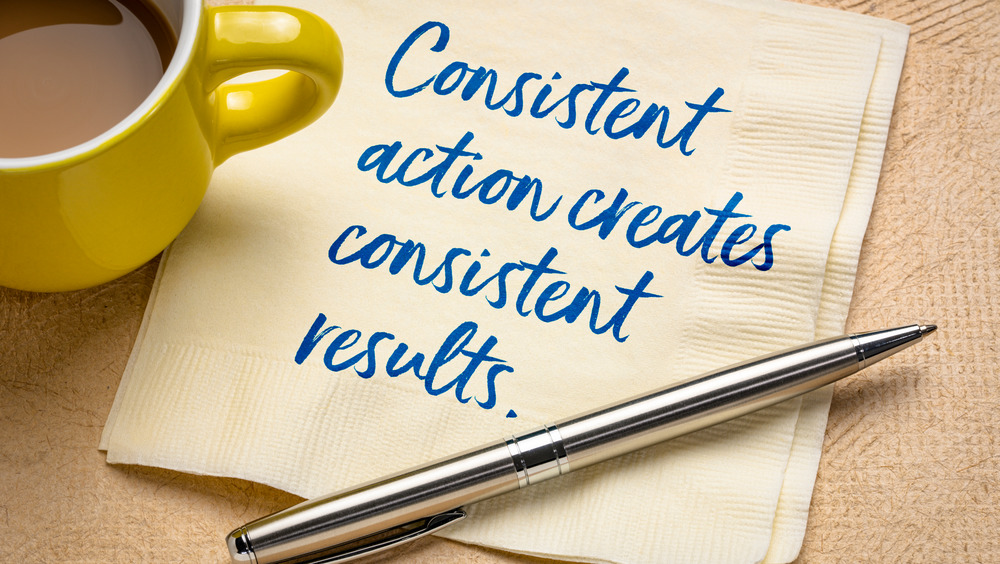The Real Reason You Need To Start Using Affirmations
Affirmations are statements that can help one challenge and overcome negative thoughts are often used by people looking to make a positive change in their lives through the power of words. The use of affirmations may help reprogram one's thinking patterns, so in time, a person can respond differently to a particular situation. In the same way that exercise helps generate and maintain physical health, affirmations are a way to exercise the mind and improve one's outlook on life. Some experts believe affirmations can alleviate stress and foster an overall sense of wellness.
Sounds nice right? According to Healthline, "These simple statements help shift your focus away from perceived failures or inadequacies and direct your focus toward your strengths — those you already have and those you want to develop ... but they're not a magic bullet for instant success or healing."
Let's take a closer look at the concept of affirmations and how they could benefit your life.
Your brain sometimes mixes up reality and fantasy
Dr. Ronald Alexander, Ph.D. wrote an article for Psychology Today explaining the potential power of affirmations. Whether you're telling yourself something positive — "I know you can do it" — or something negative — "You'll never reach your goal" — affirmations can "program your mind into believing the stated concept."
In other words, we know our brains are easily impacted by outside forces. Have you ever cried over a 30-second greeting card commercial or felt pumped up by a sports montage? According to Alexander, "the mind doesn't know the difference between what is real or what is fantasy. When you watch a movie, and you start to laugh or cry, your mind is empathizing with the characters on the screen even though it is only Hollywood magic."
According to Healthline, the challenge is using your brain's adaptability — a.k.a. neuroplasticity — for good. Alexander noted that some people do not believe in the practice of affirmations because their thought patterns are so directed toward negativity that any positive statements are virtually ignored. However, there are some strategies you can try to make affirmations more effective and powerful.
These strategies can help you use affirmations
One way to allow affirmations to help foster happiness and fulfillment in your life is by identifying what you believe to be your negative qualities. Write them down. Then write an affirmation that counters the negative thoughts.
Dr. Ronald Alexander, Ph.D. explored this concept in Psychology Today. For example, replace a statement like "I'm unworthy" with something powerful, such as "I'm remarkable and cherished," he said. The next step is to practice that affirmation. Alexander recommends repeating it three times a day for about five minutes at a time. You can also try writing down the affirmation repeatedly, or you can ask someone close to you to read your affirmation to you. Hearing someone you trust and care about speak affirming words can reinforce a strong feeling of positivity. "If you don't have someone whom you feel comfortable asking, then use your reflection in the mirror as the person who is reinforcing the healthy message," Alexander said.
Consistency is key when using affirmations
Repeating positive words can help boost one's motivation and confidence, but without action, affirmations are still just words. Use your affirmations to prompt you to do something.
"An affirmation like 'I can remain calm even when I feel annoyed' might guide you to a habit of deep breathing or grounding exercises when you start to feel your blood boil," reports Healthline.
Affirmations also need to be realistic. For example, repeating to yourself that you're going to become a millionaire in six months? That's setting the bar a bit high, don't you think? However, "imagine that you're unhappy with the level of pay that you currently receive," reports Mind Tool. "You could use affirmations to raise your confidence to ask for a raise."
Maybe you can't affirm your way into becoming a world-renowned concert pianist or an Olympic athlete, but you could use affirmations to work up the nerve to sign up for piano lessons or to motivate yourself to train for a 5K. The idea is to use the affirmation to encourage you to take action toward reaching a goal or changing your mindset.
Positive affirmations don't work for everyone
Research suggests that positive affirmations don't work for everyone? Great, so why are you reading this? Don't worry, using affirmations doesn't necessarily have to involve speaking glowing, joyful, rainbow-coated statements to yourself. Instead, neutral affirmations may prove more effective for some people.
Emotional resiliency coach Carmen Isáis wrote about this concept for HuffPost, explaining that "the inherent flaw with affirmations" is that they may essentially "throw a whitewash of positivity over a mountain of negative thinking." A better approach for some — particularly those with low self-esteem and high anxiety — is to "bust up and clean out the negative thinking that is already there" by focusing on more neutral statements. Instead of saying, "Every day, in every way, I am getting better and better," Isáis recommends trying something more neutral. "I have had better days, but I have also had worse. Today I am OK."
Neutral statements allow a person to make changes without the added pressure of lofty expectations and disappointment. The idea is to move away from negative thinking, but you don't have to dive into the deep end of the positivity pool. Maybe just dipping a toe in is the best strategy for you.
Remember that meaningful change takes time. "With affirmations, the goal is to literally rewire your brain. You're breaking yourself out of old, toxic habits and replacing them with new, positive ones," says life coach Dawn Perez of Wild Simple Joy. "Changing your brain chemistry and neural pathways isn't going to happen overnight."




